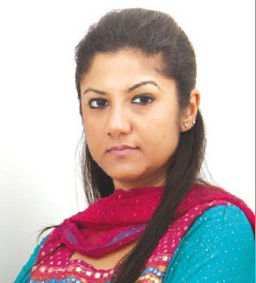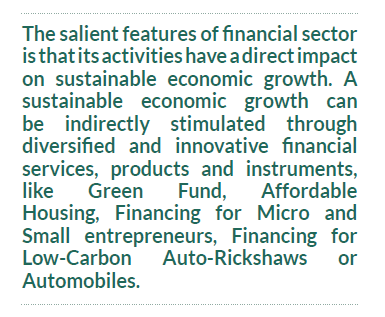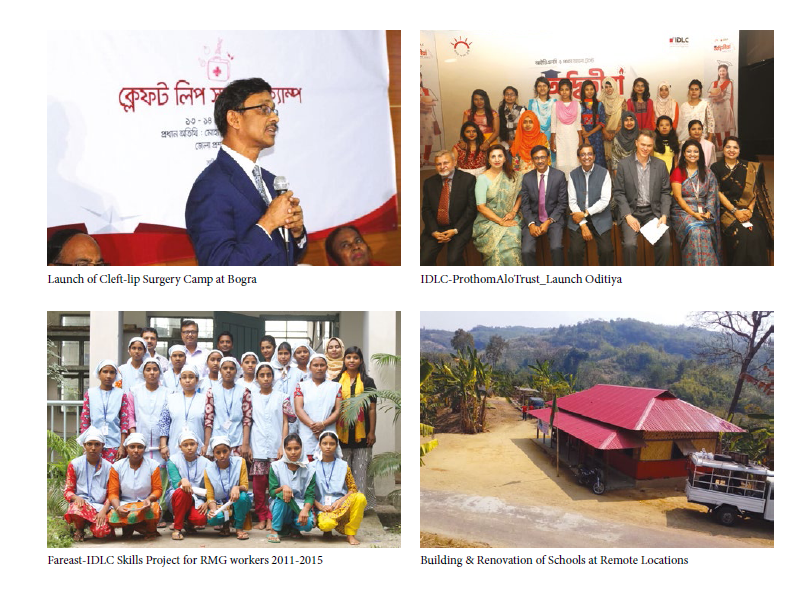Ayesha Haque, Head of CSR, IDLC Finance Limited


Ayesha is passionate about driving sustainability initiatives and deeply appreciates seeing how sustainability and the use her strategic thinking can help make people’s lives better. With over 14 years’ experience with multilateral/bilateral agencies an donor organizations, she envisions to continue solving complex problems and her background in marketing helps her use communications as a tool for positive change. Prior to IDLC, she served Swisscontact Worldwide, Mott MacDonald and Banglalink. Ayesha has conducted several international audits for projects and country offices as Gender & Communications specialist including Nepal, Arnhem and Zurich.
The term ‘sharing’ is gaining ground as a concept that thrives on bridging needs with resources in the mos efficient and effective way. This was earlier restricted to an informal exchange of products has assumed a whole new meaning. Today, it represents a new form of institutional partnership that stands to benefit all constituents of the ecosystem and signifies innovations that generate sustainable economic outcomes which permeate right down to households.
Fundamentally the underlying proposition of the shared model is anchored on the power of collaboration and this concept is now bringing forward a disruptive impact in the field of CSR (‘Corporate Social Responsibility’). So while some companies are judging CSR to be an obligatory expense or marketing gimmick to reap more profits, some others are going way beyond ‘the act of responsibility’ towards true ownership of the shared CSR model with the overarching intent of ‘keep doing well by doing good’.
In the context of Bangladesh, such a ‘shared’ socioeconomic CSR model is the need of the hour as it aggregates individual strengths for impact that can be maximized, for expenditure that can be divided and for a larger number of beneficiaries that can be targeted, thereby creating the scope for a characteristic archetype of enduring sustainability. This shared-value model represents a nationally-relevant CSR strategy for Bangladesh and why this is so has been explained through few flagship projects and initiatives of IDLC.
The shared model helps solve a circumstantial challenge: Paradoxically, though Bangladesh is among the most populous countries with major shortage of skilled manpower. This has the potential to turn the country’s demographic dividend into a divisive drawback. One of the flagship first projects from 2012 – 2015 has been the skills development project of IDLC in collaboration with its long-standing corporate client Fareast Knitting & Dyeing Industries. The IDLC Fareast Skills Development Project was conceived to fulfill an active role in solving this conundrum by providing trained manpower (marginalised women) to the textiles sector, which is one of the largest employers in Bangladesh. This was a successful collaboration of PPP whereby the Directorate of Technical Education Board was represented by GoB, Fareast Knitting & Dyeing Industries represented the private sector engagement mobilized through the ILO TVET Report Project in coordination with IDLC Finance Limited. At the end of the project about 60% of the trained workforce was retained in the industry. Through this construct, the program also took the issue of women empowerment head-on – almost 50% of the country’s population is represented by the female gender.
The shared model represents a case of sustainable mutual benefit: Such a platform exemplifies the coming together of institutional partners with common interests, such as corporates who look to meaningfully engage in their social responsibility activities, resource or employment providers who seek to create a skilled talent pipeline and consumers or beneficiaries themselves who aspire to move up the economic ladder. In this context, the IDLC-Prothom Alo Trust partnership ‘Oditiya’ (scholarship project for Asian University for Women undergraduate program) which aims to encourage quality education and empowerment of first females in their families who have the interest and aptitude but financial limitations to be enrolled in higher education. Through this scholarship program IDLC-Prothom Alo Trust committed to support 10 female students each year for four batches 2017 – 2020. Through this project IDLC, Prothom Alo and AUW envisions to empower young girls who will not only be academically competent but also worthwhile contributors to their communities.
The shared model has been streamlined for impact maximization and community engagement: Launched in 2017 IDLC’s CSR platform ‘Khushir Kheya’ is a Community Service initiative to create awareness and promote active ‘volunteerism’ among both IDLC employees and local volunteers. The purpose of “Lywki †Lqv” highlight and reinstate IDLC a good corporate citizen and much more than a financial institution. The overall objective of this platform is to convert every IDLC Branch and touch points as a community lighthouse that has the ability to alleviate and eliminate community problems and issues across the broader fields Education, Preventive & Curative Healthcare and Environment. Over 550 volunteers were mobilized our on-line CSR platform Khushir Kheya donating around 3000 volunteer hours for working together to resolve issues at community level, resulting in over 34,000 smiles since 2017.

The shared model has been anchored on sustainable financing models and repeatability: The mission of the Green Banking Unit (GBU), under the jurisdiction of Corporate Division is to promote environmentalfriendly practices and reduce carbon footprint from our banking activities as well as our clients. GBU operates dedicatedly in the financial sector with special focus on customers’ unique needs which we deliver through highly personalized and responsive service targeting the conservation of environmental, ecological and social due diligences. Portfolio wise GBU has exceled its previous year times and it has anchored us as the frontrunner in promoting sustainable business practices in Bangladesh. Today, Green Banking differentiates IDLC from conventional financing institutes, as a responsible financial brand that assists and facilitates advancement to the next generation financial market that thrives in green technologies.
Since 2011, IDLC has consistently published and reported its sustainability initiatives through an Annual Sustainability Report in compliance to Global
Reporting Initiative (GRI) guidelines, which has now been adapted and mandated by the Bangladesh Security and Exchange Commission to be mandated for all corporate stakeholders and not just for the Banking Industry. This exemplifies the repeatability aspect, which also further enhances and augments to the brand image and communicates it to be a transparent and credible partner for investors and creditors likewise. Recently IDLC’s role in Bangladesh in the context of Sustainability reporting has been endorsed through a case study published on the GRI website. However, although gaining ground there are several multiple challenges when we consider the CSR practices of the industry. Primarily, there is a lack of awareness, understanding and professionals on CSR. Although the essence remains corporate philanthropy, CSR is still perceived as a marketing gimmick to earn more profits and more of a temporary and not a long-term approach.
As we enter 2019, commitment to a long-term approach is more important than ever – the global landscape is increasingly fragile and, as a result, susceptible to shortterm behavior by corporations and governments alike. Around the world, frustration with years of stagnant wages, the effect of technology on jobs, and uncertainty about the future have fueled popular anger and xenophobia. In response, some of the world’s leading democracies have descended into wrenching political dysfunction. Unnerved by fundamental economic changes and the failure of government to provide lasting solutions, society is increasingly looking to companies, both public and private, to address pressing social and economic issues. Companies that fulfill their purpose and responsibilities to stakeholders may continue reaping rewards but those that ignore will stumble and fail. This dynamic is becoming increasingly apparent as the public holds companies to more exacting standards. And it will continue to accelerate as millennials – who today represent 35 percent of the workforce – express new expectations of the companies they work for, buy from, and invest in. Attracting and retaining the best talent increasingly requires a clear expression of purpose. In a recent survey by Deloitte, millennial workers were asked what the primary purpose of businesses should be – 63 percent more of them said “improving society” than said “generating profit.”
Going forward, the views of these generations will drive not only their decisions as employees but also as investors, with the world undergoing the largest transfer of wealth in history from baby boomers to millenials (UBS reports millennials could be worth up to $24 trillion by 2020). For their part, UBS suggests three differences in millennial traits compared with older generations: a desire for convenience, multichannel delivery, and transparency. As wealth shifts and investing preferences change, environmental, social, and governance issues will be increasingly material to corporate valuations. Therefore it is critical that we not only we devote resources towards improving the data and analytics for measuring these factors, integrate them in our business strategy but also engage with companies, partners and clients at a personal level to better understand and serve them and thereby be recognized as a responsible, inclusive and best financial brand in the country.

Monthly Business Review- June 2019
More sustainable CSR initiatives in the offing
Corporate Social Responsibility (CSR) and sustainability have been at the forefront of most companies’ agendas for quite some time- it is no longer a “nice to have” but a “need to have.” The fact that millennial have a high level of social awareness and they are entering into the formal job market, gives most corporations solid reason to be “purpose-driven”. Giant corporations like Google, Microsoft are deemed as the world’s most reputable companies for CSR activities. Having said that, Financial Institutions are coming in the front row in the realm of CSR and sustainability.
In Bangladesh, the banking sector is embracing a bunch of initiatives to address social/environmental issues. IDLC CSR Guideline confers to International Standards and has maintained signatory membership status with both United Nations Global Compact (UNGC) and United Nations Environment Programme Finance Initiative (UNEPFI) since 2011. In the past few years, commercial banks of Bangladesh have witnessed a splendid CSR expenditure in areas of education, health and disaster management. The CSR outlay took a leap in 2018 to BDT 904.7 crore from BDT 743.9 crore in 2017, triggering 21% y-o-y growth. In order to raise the banking sector’s spirit to be engaged in sustainable CSR initiatives, Bangladesh Bank determined some areas of tax exemption related to CSR for Financial Institutions. When that is a good start to make the financial sector more people and community-oriented, it has to be kept in mind that whether these initiatives are bringing infrastructural development for the long term benefit rather than being just a one-off initiative.
Download View